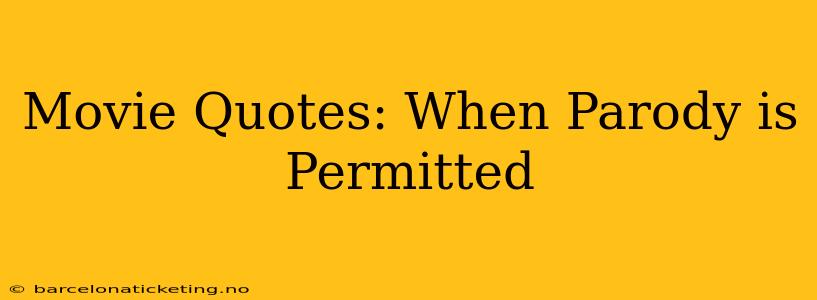Movie quotes are ingrained in our cultural consciousness. They're snippets of dialogue that transcend the films themselves, becoming catchphrases, memes, and even part of everyday language. But what happens when someone wants to use a famous movie quote, not as homage, but as part of a parody? Where's the line between fair use and copyright infringement? This is a complex legal area, and understanding the nuances is crucial for anyone considering using copyrighted movie quotes in a parody.
What is Fair Use?
Before diving into the specifics of parodying movie quotes, we need to understand the concept of "fair use." This is a legal doctrine in the United States (and similar doctrines exist in other countries) that allows limited use of copyrighted material without permission from the copyright holder. Fair use is determined on a case-by-case basis, considering four factors:
- The purpose and character of the use: Is the use transformative? Does it add new meaning or message to the original? Parody is generally considered transformative.
- The nature of the copyrighted work: Is the original work factual or fictional? Fictional works generally have greater protection than factual works.
- The amount and substantiality of the portion used: Using only the necessary portion of the copyrighted work is crucial. Using the entire quote is less likely to be considered fair use than using a small, essential part.
- The effect of the use on the potential market for or value of the copyrighted work: Does the parody harm the market for the original work? This is a key consideration.
Can I Use a Movie Quote in My Parody?
The short answer is: maybe. The key is transformation. A successful parody doesn't simply repeat the original quote; it uses it in a new context to create a humorous or satirical effect. The new work must offer something beyond mere imitation. If your use of the quote is purely for commercial gain and doesn't add any significant transformative element, it's less likely to be considered fair use.
How Much of the Quote Can I Use?
This depends entirely on the context. Using only the crucial part of the quote needed to convey the parody is generally preferred. The more of the original quote you use, the higher the risk of infringement. Consider whether you could achieve the same satirical effect with less of the quote.
What if My Parody is Non-Commercial?
While non-commercial use might tilt the scales towards fair use, it's not a guarantee. The transformative nature of your work is still paramount. A non-commercial parody that merely copies the quote without adding any significant commentary or satire is still likely to be considered infringement.
What if I Want to Use a Movie Quote Commercially?
Using a movie quote for commercial purposes significantly increases the risk of copyright infringement. Even if your use is transformative, you're more likely to face legal challenges. It's highly advisable to obtain permission from the copyright holder, typically the film studio. This often involves paying a licensing fee.
How Do I Get Permission to Use a Movie Quote?
Finding the appropriate copyright holder can be challenging. It's essential to conduct thorough research. Once you've identified the holder, you need to contact them directly and request permission to use the quote in your project. Be prepared to provide details about your project and how you intend to use the quote.
Consequences of Copyright Infringement
Using copyrighted material without permission can lead to significant legal consequences, including:
- Cease and desist letters: Demanding that you stop using the quote and potentially pay damages.
- Lawsuits: Resulting in substantial financial penalties and legal fees.
- Removal of your work: Platforms such as YouTube or social media may remove your parody if it infringes on copyright.
Conclusion
Determining whether the use of a movie quote in a parody is permitted depends heavily on the specific circumstances. The transformative nature of the parody, the amount of the quote used, and the commercial nature of the use are critical factors. When in doubt, seeking legal counsel is always recommended, especially for commercial projects. The cost of legal fees is far less than the potential cost of a copyright infringement lawsuit. Understanding fair use and copyright law is crucial for creators aiming to navigate this complex legal landscape.

